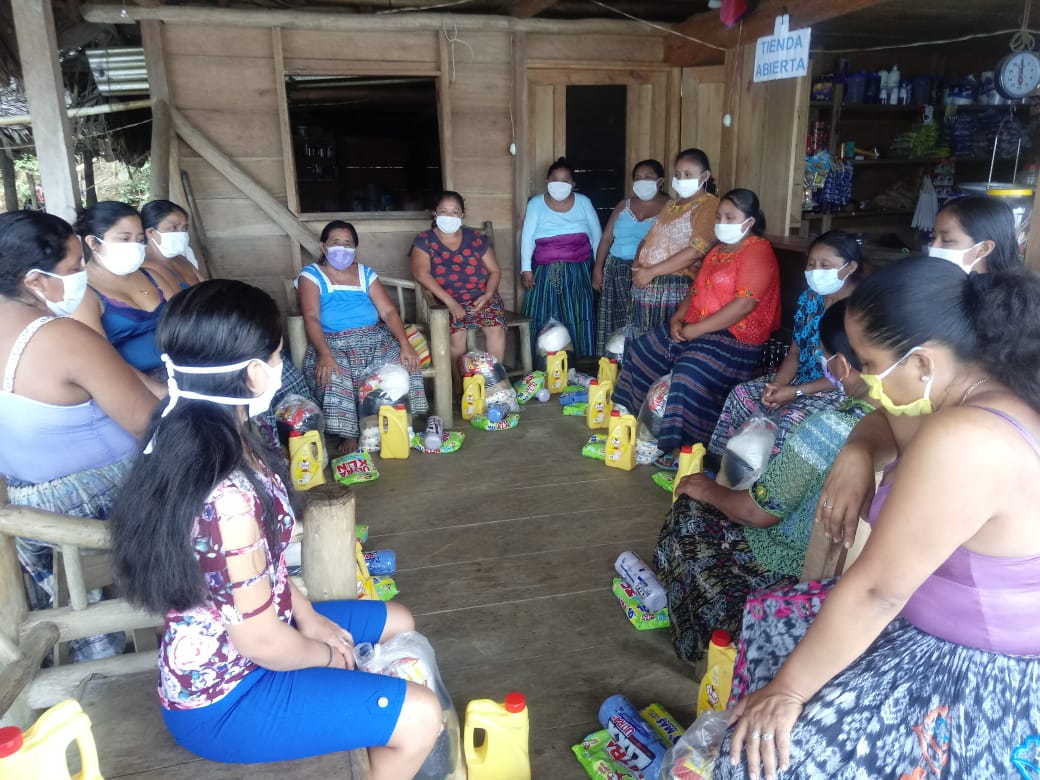Strengthening indigenous rights and leadership in the face of global challenges - COVID-19, climate change and environmental degradation
Around the world, the spread of the COVID-19 pandemic has revealed and deepened existing patterns of social inequality and vulnerability. In particular, indigenous peoples face disproportionate and severe impacts, reflecting long-standing disparities in health services, economic access and political power ⏤ all while climate change impacts and environmental degradation continue.

Rural and indigenous women are particularly impacted by the COVID-19 pandemic. Here, Maya Q'eqchi women from Guatemala learn about further sanitation protocols while sharing ancestral knowledge of natural medicines found in their forests and family gardens.
Las mujeres rurales e indígenas son particularmente impactadas por la pandemia de COVID-19. Aquí mujeres, Maya Q’eqchí de Guatemala aprenden sobre los protocolos de saneamiento, al mismo tiempo que comparten conocimientos ancestrales sobre las medicinas naturales que se encuentran en sus bosques y huertos familiares.
Photo: Asociacion Ak´Tenamit
The threat of COVID-19 on indigenous communities
Working together, IUCN Member IPOs and the IUCN Secretariat are calling international attention to the impacts COVID-19 is having on indigenous lands, territories and waters. Today, to mark the International Day of the World’s Indigenous Peoples, a new brief aims to shed light on not only the impacts of COVID-19 on indigenous communities, but also the solutions they are innovating and adapting to address challenges. Amplifying indigenous voices: IUCN indigenous members’ solutions and challenges related to the COVID-19 crisis has been produced through an inclusive process of information gathering among IPO Members and IUCN advisors, to share proposals for further action to strengthen and enhance the resilience of indigeous peoples.
Around the world, indigenous peoples are fighting the pandemic, taking drastic steps to protect their communities from the virus ⏤ particularly as historic and systemic barriers to health services create deeper conditions of vulnerability. From voluntary isolation, to applying indigenous medicinal knowledge, to closing access to territories, to youth activism to spread preventative measures and techniques, to adapting trade, market and agricultural processes ⏤ indigenous peoples are working to stem the spread of the virus while protecting their way of life. The urgency of these efforts is heightened as attempts to appropriate traditional territories and resources for commercial exploitation, forest fires and other threats continue and further undermine indigenous rights.
Addressing challenges ⏤ together
The insights gathered in this IUCN brief can support the global community in designing and promoting inclusive pathways in the face of COVID-19 while concurrent long-term challenges, such as climate change and environmental degradation, remain.
“We are at the heart of sustainable development and the overall integrity of the planet.” - Dr Dalee Sambo Dorough, International Chair, Inuit Circumpolar Council
IUCN has long recognized the vital role that indigenous peoples play in conserving landscapes, seascapes and the natural resources of the world’s most biodiverse regions. Indigenous knowledge, cultures, governance and economic systems help protect our future by contributing solutions to the most pressing environmental challenges facing the globe and humanity, including climate change and environmental degradation. To strengthen the voice, roles and rights of indigenous peoples in conservation, during the previous World Conservation Congress, IUCN made the historic decision to create a new category of membership specifically for indigenous peoples organizations (IPOs).
Ahead of the 2020 World Conservation Congress in Marseille, France, IUCN IPO members are leading the organization of a summit, working in conjunction with key IUCN Global Programmes and Commissions, to define a set of key proposals to advance their priorities for nature and people. These proposals will be open to statements of commitment and support from States, international organizations and civil society. As Juilo Cusurichi Palacios, President of the Native Federation of the Madre de Dios River and Tributaries (FENAMAD) in Peru has shared, the summit further supports IPOs in defining a roadmap that advances the self-determination of indigenous stewardship over lands, territories and seas. These inputs will also promote the voices of indigenous women, who have specialized knowledge and experiences in protecting nature, as shared by Rosa Canelos, Director of the Sacha Warmi Foundation’s “Women, Family and Territory” programme in Ecuador.
IUCN recognizes that indigenous peoples, including its IPO Members, have strongly contributed to the conservation of nature. Today, they also contribute to our Union and the work we do all over the world. As Dr Rashed Al Mahmud Titmir, Professor of Economics at the University of Dhaka and Chairperson of Unnayan Onneshan, demonstrates, indigenous peoples contribute diverse knowledge and practices that benefit people and protect nature. At IUCN we also recognize that if we want to have a healthy planet for generations to come, we must continue to support the health and vital stewardship roles of indigenous peoples by strengthening their resilience to this pandemic. This means supporting their work and rights as indigenous peoples, and valuing their unique skills in balancing local health, food security and resource needs with the health of the planet and its inhabitants.
Together, IUCN IPOs and stakeholders seek to approach the future with hope:
“After 2020, we will have to move to concrete actions… and create a real mechanism that integrates us all and, together, push the agenda in one direction, which is conservation and future generations.” - Onel Masardule, Executive Director of the Foundation for the Promotion of Indigenous Knowledge (FPCI).
To learn more about COVID-19 and the resilience of indigenous peoples, see the brief here.
You can also learn more about the World Summit of Indigenous Peoples and Nature, scheduled to take place from 6-7 January, 2020, ahead of the IUCN World Conservation Congress here.



